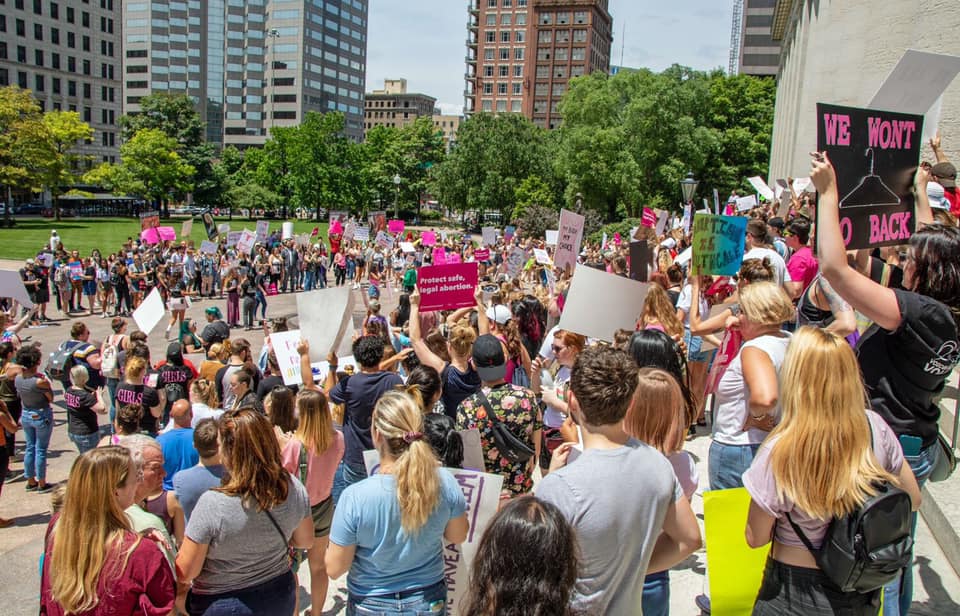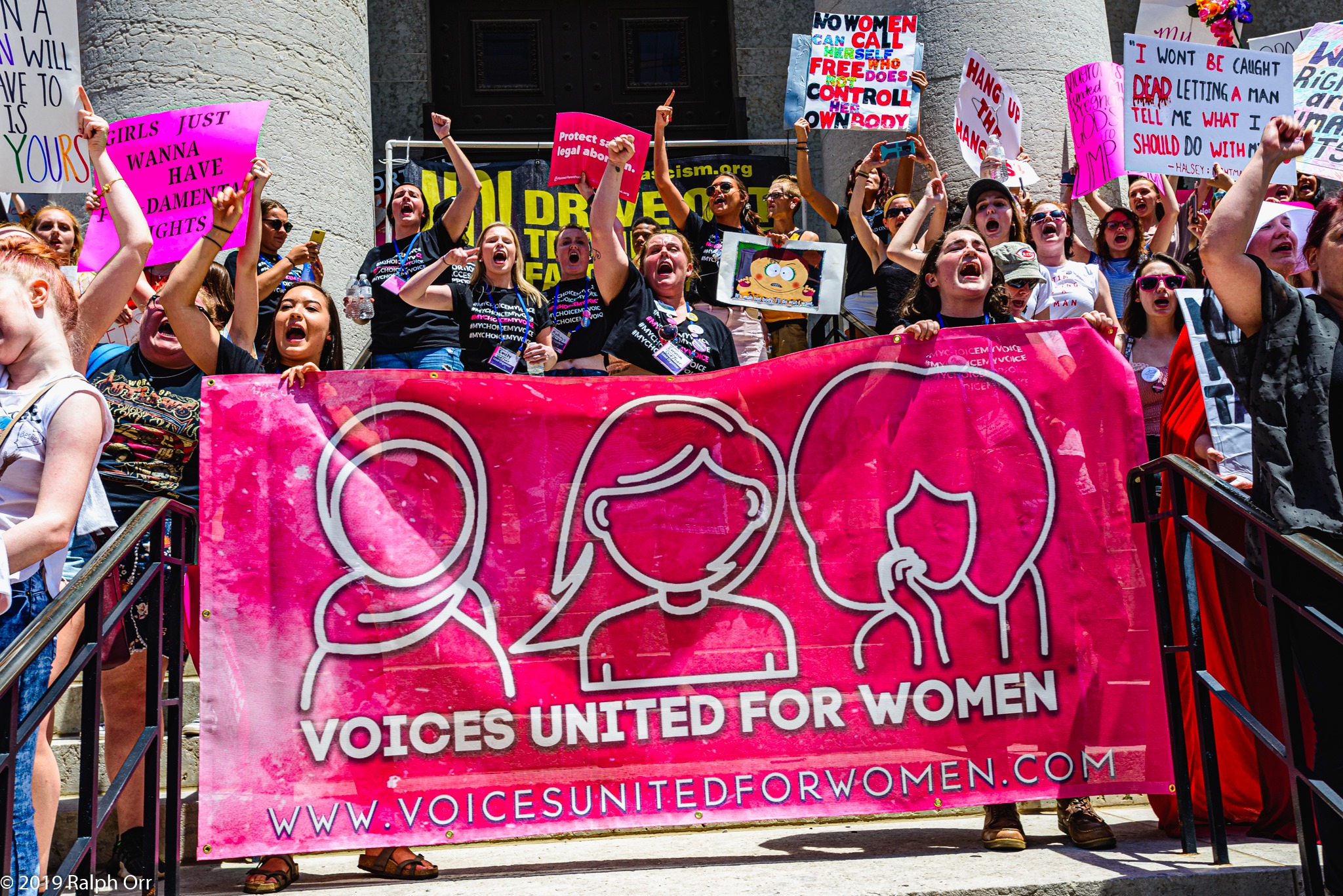On June 22, Voices United for Women, an organization that is designed to help women, femmes and their allies, held a demonstration that started at McFerson’s Commons in the Arena District in Columbus, Ohio and ended at the statehouse steps, a reaction to April’s “heartbeat bill.”
Since the “heartbeat bill’s” inception back in April, when Ohio Governor Mike DeWine signed it into law, the bill’s been riddled by a bevy of backlash from pro-choice and women’s rights groups across Ohio and the rest of the nation.
“I think that this is a longtime coming attack on women because of the lies that have been spread around this,” said Emily Parris, Co-Founder and President of Voices United for Women, a women’s rights group. “I think that it’s pretty clear that this isn’t just an attack on wanting unborn fetuses to have a ‘chance to live.’ This is a way to control a woman’s right to her body.”
The law is another in a long line of bills introduced over the past year throughout the United States, the strictest of which lies in Alabama’s law, which bans all forms of abortion, even in cases of rape or incest, and carries up to 99 year sentences.
“That turns back the clock to pre-1970s,” said Parris of the laws proposed in Alabama and across the country. “That turns back the clock to all that we’ve been able to accomplish in the fight for reproductive justice, that the women whose shoulders we stand on in this fight have worked so hard to accomplish, and I think that, you know, the big fear is that this would end up with the re-examination of Roe.”
“The heartbeat bill has the potential to be the vehicle that overturns Roe v. Wade,” said Mike Gonidakis, President of Ohio Right to Life, the state’s oldest and largest pro-life group. “We know that this temporary restraining order is just a step in the process to finally seeing Roe reconsidered.”
“The essential function of government is to protect the most vulnerable among us, those who don’t have a voice,” said DeWine at the time of the bill’s signing. “Government’s role should be to protect life from the beginning to the end.”

U.S. District Judge Michael Barrett blocked Ohio’s “heartbeat bill” the first week of July, so named because a fetal heartbeat can be heard at six weeks, the proposed barrier for abortions.
“These abortion bans are unconstitutional and strip away a woman’s timely right–cause I think that that’s the big thing, right?” said Parris. “It’s that six weeks ban. While technically it doesn’t ‘ban abortion,’ many women don’t know that they’re pregnant at six weeks.”
“Let’s say you’re in a long-term relationship,” said Parris. “A cisgender woman is married to a cisgender male. You know, she gets pregnant and she wants an abortion. Is it her husband’s right to oppose that? Of course. It’s his right to oppose that. Right? He can have his opinion all he wants. Or our legislators can have their opinion all they want. At the end of the day, we have to recognize what I don’t think a lot of people are talking about which is bodily autonomy.
“It’s the same thing as giving blood. Let’s say myself and another person are the only people with AB+ blood type in the entire world. And I’m the only person that can save their life.
“You cannot force me to give blood to them. Of course I would, personally, but you cannot force me if I don’t want to. So, you cannot force me to sustain life. Just in the same way that you cannot force me to be an organ donor and you cannot force me to be a human incubator. And so at the end of the day, I think it is 100% a person’s right to choose what happens to their body.”

At the Voices United event, Columbus City Council President Pro Tempore Elizabeth Brown spoke about the bill and about legislators around the country and their intent with the heartbeat bill and others like it.
“If you look around the country and you look at states that have the most restrictions on abortion care, you will see that correspond to the worst health outcomes and for babies,” Brown said. “So let’s be clear about what restricting abortion does: It makes babies less healthy and it makes women less healthy.”
“If you are really concerned with protecting life from beginning to end, I think that maybe [DeWine] should care about life post-birth,” said Parris. “I think that maybe you protect having access to healthcare, protect having access to education, and drug pricing that’s affordable, and career opportunities that pay men and women equally.
“I don’t think that then we have an issue on abortion, we have an issue on which lives and which people should be protected.
“When I see Christianity taking over the government of my country, even as a Christian, I have to pause and say, no that’s not what we are as a country. We came here to escape religious oppression and how dare we pass laws that are based in religious truth.”
“To be completely transparent,” said Parris on the formation of Voices United, “We were not really looking to start an organization, but as we talked to people, both people who have been in women’s rights fields for decades and people like us who were in college and we came to the realization that a rally or a protest or whatever terminology you want to use for this type of event really means nothing if it’s not tied to a larger strategy.

“To put it bluntly, no legislator looks at a protest and says, you know what they’re right. I was gonna vote for this but now that I see all of these young women, I think I’m going to change my mind. That’s not the reality of it. And as much as we would love for that to be the case, it’s not.
“So, what we recognized that we were able to tap into a group of people who had never been politically involved before but wanted to now. And we said, okay, so what are these people missing? Why have they not gotten involved before? And it was simply because they didn’t feel like they had a place to belong. And so we all kinda looked at each other in a team meeting one day, pretty early on in the planning process and said we gotta give them a place where they feel like they have a voice that is valued.
“So, we brought other organizations in like Fight For Her Ohio, Women Have Options, The ACLU, Planned Parenthood… We connected with organizations that had volunteer opportunities and said let’s give them the opportunity to speak and then pass out their information.
“To say, here are the volunteer opportunities you have, here’s where you can donate, here’s what you can tweet to get our message out. Giving people very specific directions of what they can do to help. I think that makes people walking away from a protest a little more fulfilled and then gives them something to do afterwards.”
Richard Foltz
Managing Editor

